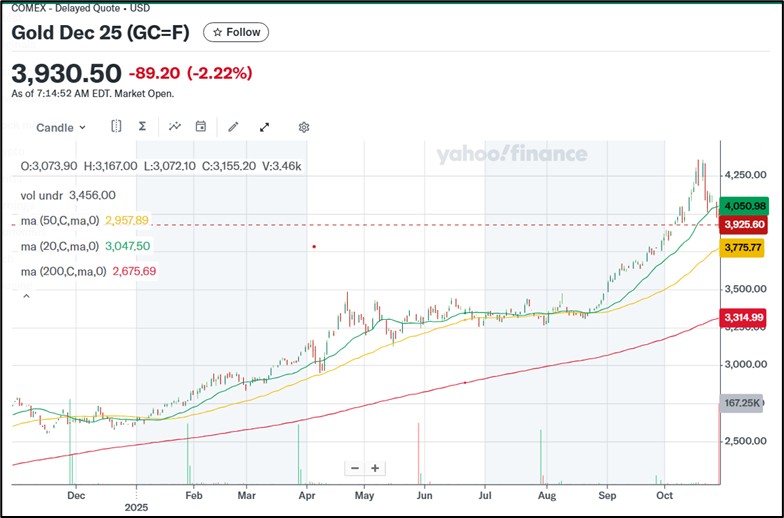Daily Comment (October 28, 2025)
by Patrick Fearon-Hernandez, CFA, and Thomas Wash
[Posted: 9:30 AM ET] | PDF
Our Comment today opens with a few notes on the recent pullback in global gold prices. We next review several other international and US developments with the potential to affect the financial markets today, including two new deals in the red-hot areas of artificial intelligence and nuclear energy and another high-profile expression of concern that bad loans in the private-credit industry could lead to wider financial problems.
Global Gold Market: As of this writing, gold prices have fallen decisively below the psychologically important $4,000-per-ounce mark for the first time since spiking above that level in early October. As we have warned previously, signs of a thaw in US-China relations have probably taken some safe-haven bid out of the yellow metal, at least temporarily. We remain bullish on gold over the longer term, but a short-term pullback would not be unusual. We see gold’s next significant support levels at about $3,730 and $3,640.
US Artificial Intelligence Industry: Renewable energy giant NextEra and Google have struck a deal under which NextEra will restart a 615-megawatt nuclear generating station in Iowa to sell Google electricity over the coming 25 years, mostly for its artificial-intelligence data centers. The nuclear plant, known as the Duane Arnold Energy Center, has been shuttered for the last five years; a reopening is expected to cost about $1.6 billion
- The deal is the latest in a string of such agreements designed to feed the enormous power needs of the AI industry.
- The deals involving nuclear plants are helping foster renewed interest in the technology, which in turn is helping foster strong demand for uranium and boosting the stock prices of uranium miners.
US Nuclear Energy Industry: In another, broader nuclear deal, reports today say the US government and Cameco, the owner of reactor builder Westinghouse, have struck a deal under which the US will provide $80 billion to Westinghouse for land purchases, permitting, and business development costs associated with building about eight modular reactors, a mix of large and small. The $80 billion would be part of the funds Tokyo agreed to invest in the US under its recent trade deal with Washington.
- Consistent with other recent deals, the federal government would get a 20% share of Westinghouse’s profits from the reactors once it has distributed $17.5 billion to its current owners. The US government can also require Westinghouse to go public if its value exceeds $30 billion by 2029 and then convert its profit share into a 20% equity stake in the company.
- Those features will likely keep alive concerns regarding government ownership of productive facilities and possible interference in the operations of private companies.
US Financial Industry: The chief financial officer of banking giant HSBC has issued another high-profile warning about financial risks in the burgeoning private-credit industry. The official stressed that HSBC has very little direct exposure to private-credit firms that may be facing soured loans, but he warned that second- and third-order risks could be important. His comments echo those of JPMorgan CEO Jamie Dimon, who recently warned that the few “cockroaches” seen so far probably point to a broader infestation.
US Monetary Policy: Today, the Fed’s policy committee starts its latest two-day meeting, with its decision due on Wednesday at 2:00 PM ET. Based on interest-rate futures prices, investors widely expect the policymakers to cut their benchmark fed funds rate by 25 basis points to a range of 3.75% to 4.00%. In the policy statement and Chair Powell’s news conference, investors will look for confirmation that the officials will keep cutting rates in the coming months, as we expect.
- Chair Powell also may announce that the Fed will stop shrinking its bond holdings earlier than the year-end date he has suggested previously.
- Investors have recently begun to call for a quicker end to “quantitative tightening” after bank usage of the Fed’s standby repo facility spiked to its highest level since the coronavirus pandemic, pointing to growing funding stress in the financial system.
United States-Japan: President Trump today hosted Japan’s newly installed Prime Minister Sanae Takaichi aboard the US aircraft carrier George Washington at its home port near Tokyo. Importantly, Trump heaped praise on the US-Japan alliance and on the conservative Takaichi, who has vowed to boost cooperation with the US and accelerate Japan’s defense spending hikes. Takaichi still wants to revisit the recent US-Japan trade deal, but today’s good vibes nevertheless are probably playing into investors’ growing sense of reduced geopolitical and trade tensions.
United States-Russia: In a sign that Russia’s top two energy companies are concerned about the Trump administration’s new sanctions on them, Lukoil yesterday said it will sell all its foreign business units as soon as possible. The sale would use a license granted by the US that expires on November 21. Press reports say that Lukoil’s foreign subsidiaries account for approximately 5% of the firm’s earnings before interest, taxes, depreciation, and amortization.
Jamaica: Hurricane Melissa, which spent much of the last week plodding through the Caribbean Sea as a mere tropical storm, has suddenly strengthened to a Category 5 powerhouse and is now bearing down on Jamaica today. The hurricane is expected to cause widespread flooding, intense winds, and significant damage. After striking Jamaica, the storm is expected to hit Cuba and the Bahamas before heading out into the open Atlantic Ocean. It is not expected to affect the US.



